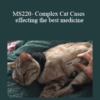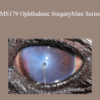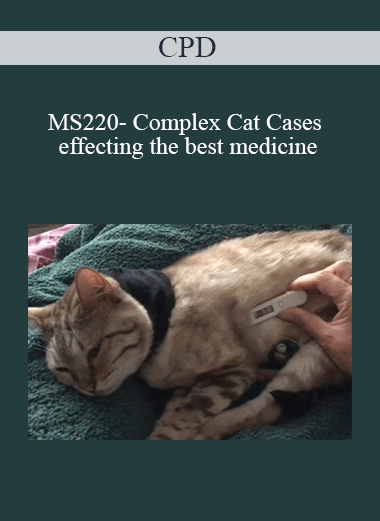$479.00 Original price was: $479.00.$114.00Current price is: $114.00.
 Purchase this course you will earn 114 Points worth of $11.40
Purchase this course you will earn 114 Points worth of $11.40Elevate your skills with the CPD – MS220- Complex Cat Cases – effecting the best medicine course, available for just $479.00 Original price was: $479.00.$114.00Current price is: $114.00. on Utralist.com! Browse our curated selection of over 60,000 downloadable digital courses across diverse Everything Else. Benefit from expert-led, self-paced instruction and save over 80%. Start learning smarter today!
Purchase CPD – MS220- Complex Cat Cases – effecting the best medicine courses at here with PRICE $479 $114
MS220- Complex Cat Cases – effecting the best medicine
£347.00 (+VAT)
12 months access to recordings and course materials is included. Please note that these are webinar recordings and not live events. Full details on how to access the Mini Series will be emailed to you.
- Join Professor Danièlle A. Gunn-Moore BSc(Hon), BVMS, PhD, MANZCVS (Feline), FHEA, FRSB, FRCVS, RCVS Specialist in Feline Medicine and Professor in Feline Medicine
for three 2-hour online sessions - Comprehensive notes to downloaded
- Self-assessment quizzes to ‘release’ your 8 hours CPD certification (don’t worry, you can take them more than once if you don’t quite hit the mark first time)
- A whole year’s access to recorded sessions for reviewing key points
- Superb value for money – learn without travelling
- Watch the recordings on your iPad!
- This Mini Series was originally broadcast in October 2020
Programme
Session 1
Cat Friendly Practice plus tips and tricks for medicating cats
We all know that a less stressed cat = less stressed owner, who will then appreciate the vet and is more likely follow their recommendations. A less stressed cat is easier to examine, with believable physical and lab values. We will consider many recommendations, including building design, type of clippers, EMLA, pre-visit gabapentin, and much more. New tips and tricks are coming through all the time – it is great to share them. Since cats can be tricky to medicate, and have very poor oesophageal peristalsis – we will then consider tips and tricks of medication, methods and rules for reformulation, new drugs e.g. transdermal mirtazapine(!), inhaled meds, home injecting, diet transitions, and more – a really practical session.
What you’ll learn:
- Understand why a Cat Friendly approach is better for the cat, the owner and the vet
- Recognise how stress affects a cat’s physical and laboratory parameters
- Understand the basic principles of becoming a Cat Friendly Practice
- Know some of the many ways in which Cat Friendly methods and equipment can have a positive effect on feline patients
- Know the many ways to increase the chance of successfully getting medication into cats
Can’t eat won’t eat – managing anorexic cat
Anorexic cat:Cats with hyporexia or true anorexia can be very challenging to diagnose and treat. Common causes will be considered, plus the negative effects of anorexia on the body. We will consider the nutritional requirements of anorectic cats and the best ways for the cat to gain them; appetite stimulation, always incorporating Cat Friendly Practice, tips, tricks and medical intervention, then decision-making when placing feeding tubes, how to place different feeding tubes, what to do when starting to feed, the risk of tube feeding, including displacement, infections and re-feeding syndrome, and what to do if they occurs. This will be followed by cases where cats were presented with anorexia/hypoxia as a major part of their clinical disease; they will include cases with respiratory and gastrointestinal disease, systemic infections, and others.
What you’ll learn:
- Know the most common causes for anorexia/hyporexia in cats
- Understand how prolonged hyporexia affects the cats body
- Know different ways to try to stimulate a cats appetite and when it is necessary to place a feeding tube (or consider parenteral nutrition*)* Total or partial parenteral nutrition will not be discussed in detail
- Know how to select which type of feeding tube is most appropriate and how to place them
Session 3
Geriatric Clinics – managing the care of these precious patients
Geriatric Clinics – Owners are often reluctant to take elderly cats to the vets – because of belief that the cat’s changes may be normal ageing; embarrassment that they cannot cope with their cat’s behavioural changes; misconception that nothing can be done; stress to the cat and owner re getting to and being at the clinic; plus worries about euthanasia. We will consider how to establish Geriatric Cat Clinics – all Cat Friendly Practice rules apply, plus the need to factor in underlying pain (especially arthritis) and confusion. Diagnosis and management is often complicated by concurrent interacting disease processes, e.g. inappropriate elimination can be caused by and/or exacerbate by dementia, arthritis, polyuria (kidney disease and/or diabetes), faecal urgency (intestinal disease), and/or constipation. And treatment can be complicated where the management of one disease may worsen another, e.g. treatment of hyperthyroidism can unmask kidney disease. Complete investigation is essential if management is to be most effective.
What you’ll learn:
- Understand the changing physiology and behaviour of elderly cats, plus the most common medical problems, and how these factors all interact to cause ill health
- Understand why owners of elderly cats are hesitant to bring their cat to the vet
- Devise ways to encourage these owners to bring their elderly cats in to the vet
- Understand how changing physiology and disease require vet care to change within the clinic e.g. support for
Purchase CPD – MS220- Complex Cat Cases – effecting the best medicine courses at here with PRICE $479 $114
Cultivate continuous growth with the CPD – MS220- Complex Cat Cases – effecting the best medicine course at Utralist.com! Unlock lifetime access to premium digital content, meticulously designed for both career advancement and personal enrichment.
- Lifetime Access: Enjoy limitless access to your purchased courses.
- Exceptional Value: Benefit from savings up to 80% on high-quality courses.
- Secure Transactions: Your payments are always safe and protected.
- Practical Application: Gain real-world skills applicable to your goals.
- Instant Accessibility: Begin your learning journey immediately after buying.
- Device Compatible: Access your courses seamlessly on any device.
Transform your potential with Utralist.com!
Related products
Everything Else
= 137 Points
Everything Else
= 85 Points
Everything Else
= 56 Points
Everything Else
= 37 Points
Everything Else
= 38 Points
Everything Else
= 37 Points
Everything Else
= 47 Points
Everything Else
= 45 Points
Login

 Purchase this course you will earn 114 Points worth of $11.40
Purchase this course you will earn 114 Points worth of $11.40










